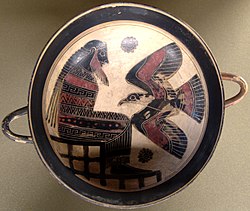List of kings of Sparta
| Sparta |
 Zeus on his throne with his eagle This article is part of the series: |
|
Great Rhetra Laws of Lycurgus Politeia |
|---|
|
List of Kings of Sparta Gerousia Ephorate Apella of the Damos Spartiates Perioeci Helots Agoge Syssitia |
|
Spartan army • Other Greek city-states • |
This article is part of the series:
Spartan Constitution
This list of kings of Sparta details the important rulers of the Greek city-state of Sparta in the Peloponnesus. Sparta was unusual among Greek city-states in that it maintained its kingship past the Archaic age. It was even more unusual in that it had two kings simultaneously, called Archagetai, coming from two separate lines. According to tradition, the two lines, the Agiads and Eurypontids, were respectively descended from the twins Eurysthenes and Procles, the descendants of Heracles who supposedly conquered Sparta two generations after the Trojan War. The dynasties themselves, however, were named after the twins' grandsons, the kings Agis I and Eurypon, respectively. The Agiad line was regarded as being senior to the Eurypontid line. Although there are lists of the earlier purported Kings of Sparta, there is little evidence for the existence of any kings before the middle of the 6th century BC or so. Spartan kings received a recurring posthumous hero cult like that of the Dorian kings of Cyrene. The kings' firstborns sons, as heirs apparent, were the only Spartan boys expressly exempt from the Agoge, however they were allowed to take part if they so wished, and this endowed them with increased prestige when they ascended the throne.
The ancient Greeks named males after their fathers, producing a patronymic by infixing -id-; for example, the sons of Atreus were the Atreids. In the case of royal houses the patronymic formed from the founder or an early significant figure became the age of the dynasty. A ruling family might in this way have a number of dynastic names; for example, Agis I named the Agiads, but he was a Heraclid, and so were his descendants.
...
Wikipedia
